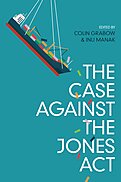The Jones Act, little studied but incredibly costly to Americans, has been on the books for 100 years. A new Cato Institute book, The Case against the Jones Act, takes aim at this destructive protectionist policy. Colin Grabow and Inu Manak are the book’s editors.
Related Book
The Case Against The Jones Act
Passed in 1920, the Jones Act restricts the waterborne transport of cargo within the United States to vessels that are U.S.-flagged, U.S.-crewed, U.S.-owned, and U.S.-built. Meant to bolster the U.S. maritime sector, this protectionist law has instead contributed to its decline. As a result, today’s U.S. oceangoing domestic fleet numbers fewer than 100 ships. The chapters in The Case against the Jones Act delve into some of the act’s founding myths and the false narrative its supporters have helped to perpetuate. The book evaluates the law’s costs, assesses its impact on businesses, consumers, and the environment, and offers alternatives for a way forward.
Learn more about the Cato Institute’s Project on Jones Act Reform or join the conversation on Twitter. #EndTheJonesAct

This work is licensed under a Creative Commons Attribution-NonCommercial-ShareAlike 4.0 International License.
